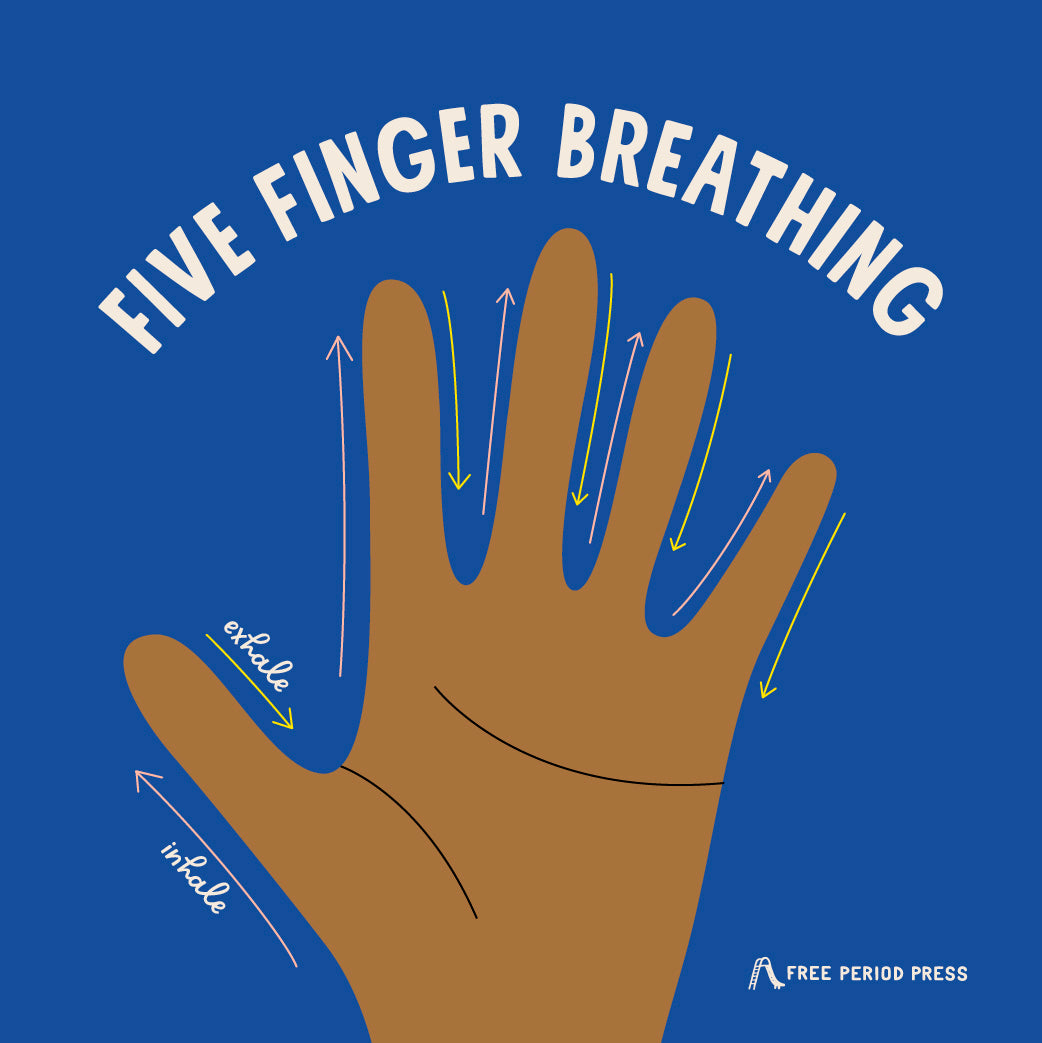Emergency techniques for working with strong emotions in the moment
🔗
- Physiological sigh
- Breathing & sighing audibly
- Placing hands on the heart
- Belly breathing
- Connecting to the feeling of feet or body being held by the earth, grounding, finding stability.
- Emotional Freedom Technique (EFT) or “Tapping”
- For panic attacks:
- Tapping slowly, firmly, but gently on the collarbone with your palm.
- Five Finger Breathing: Trace the fingers of one hand up and down with each breath in and out, eventually slowing your breath so that you inhale once and trace up and down all fingers in one long, gradual exhale. Inhale again when you reach the pinky, exhale tracing up and down each finger from pinky to thumb.
Investigating/questioning:
What does this feel like right now?
What is happening right now in the body?
What is underlying this feeling right now?
Three Primary Kleshas or “Pain-causing emotions”
The dharma tells us that all our experiences of discomfort, anxiety, being disturbed, and being bothered are rooted in our kleshas. This Sanskrit term means “destructive emotions” or “pain-causing emotions.”
The three main kleshas are craving, aggression, and ignorance. The first two don’t require much explanation. “Craving” becomes a destructive emotion when it gets to the point of being an addiction or an obsession.1
“Aggression” is the opposite: we want to get rid of something that we perceive as a threat to our well-being.
“Ignorance” as a destructive emotion is a little harder to understand. It’s a dull, indifferent state of mind that actually contains a deep level of pain. It can express itself as being out of touch, being mentally lethargic, not caring what we’re feeling or what others are going through. When this state of mind dominates us, it can turn into depression.1
Bringing Awareness to Emotions
In general, lack of awareness is what gives our emotions their power. Bringing awareness to them is the magic key. When we’re aware of what’s happening, they lose their ability to make us miserable.
The first step in every method of working with emotions is simply to recognize what’s happening.1
… while kleshas cause pain, the klesha energy itself is a limitless source of creative power, like an electric current. It’s not something you want to get rid of. The trick is to stay present with that energy without acting out or repressing. Doing this—or rather, learning to do this—you might find out something remarkable. In the basic energy of the kleshas, we find wisdom—ungraspable, egoless wisdom—free of grasping and fixation. 1
Our Habitual Response
When klesha energy arises, we tend to react in one of a few ways. One is to act out—either physically or with our words. Another is to suppress the emotion, to go numb around it; this may involve diverting our attention elsewhere, say by zoning out with Netflix.
A third common reaction is to get mentally wrapped up in some kind of storyline, one that often involves blame. All these reactions are based on our not being able to bear the discomfort of the energy. We have a propensity to be bothered by this energy, so we try to escape our discomfort by getting rid of what’s causing it. 1
Four steps for working with emotions in meditation (from Mingyur Rinpoche)
When practice gets too heavy/overwhelming due to strong emotions or challenging repetitive thoughts arising:2
- Sit with the emotion/do the main practice
- ”Try something different.” If it’s too strong/intense, try a different practice: awareness of breath, sound, or bodily sensations, walking meditation, movement with awareness.
- ”Step back” Try looking for the root emotion, the booster emotion, an underlying emotion like fear or anger.
- If it’s still getting too intense: take a break from meditation. Walk, do exercise, have tea, read a book, talk to a friend.
The mind needs to be directed. For example, if there is anger and you decide to investigate this emotion, you are setting the mind in the right direction. If, however, you decide to try to get rid of the anger, you are directing the mind wrongly. — Sayadaw U Tejaniya
Emotions as wisdom signals
Emotions, like anger, can be a signal about something going on under the surface, something that needs attention. Like a symptom of a sickness or imbalance. It’s a sign of things going on that should be addressed.
What is the trigger and what are the contributing factors?
allow the emotion to come up and out like vomit
So you can be resting on the table comfortably and then boom! Angry. Your mind is going to race to find something to be angry about. Ignore it. Just allow the emotion to come up and out like vomit. Don’t attach a story. Don’t explain it to me. Just take my word for it, it’s old garbage that is looking for release…. not an explanation. The same can happen with any emotion!3
What do you do when you get angry?
Lama Lekshey’s response to: What do you do when you get angry?
- First, he takes a deep breath.
- He gives no response and switches off his mobile phone.
- Then he goes to quiet place, area and stays there by himself for 1-2 hours.
- Then slowly turns phone on and gives the response to the other person, usually by that time nice words would come out.
Footnotes
-
Paraphrased from the Joy of Living program. ↩
